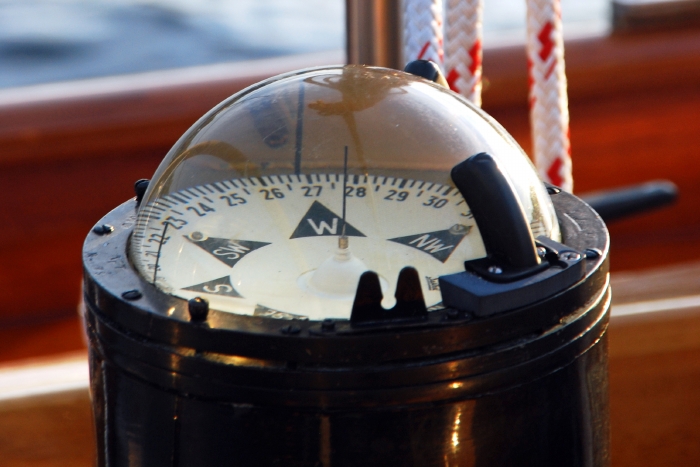I came across this quote about change, and it seemed perfectly fitting to me that it came from the story of Benjamin Button. (If you have not seen the movie, it is about a male who is born as a very old man and as he ages, he continually gets younger until he ends up a baby at the end of the story.) Personally, I found the film very disturbing, but I am sure it was just some of the visual effects they used on Brad Pitt that seared images in my mind I did not want to have — like the first time you walked into the bathroom unannounced and saw one of your parents naked. The idea of the storyline is very intriguing, though, especially if you look at it through the lens of navigating change. It serves as an interesting reminder of how every child is born a pure soul, knowing that everything comes from love and is good.
Button ends up here at the end of his life, a beautiful, pure baby. This is how we should all end up at the end of our journey here, knowing that we are inherently good, pure, and full of love. It seems ironic to me that we start in this place but lose that knowledge, and then we spend the rest of our lives trying to get it back. Have you ever noticed that a child does not see the difference between a male and female, or notice the color of someone’s skin until it is pointed out to him? A child does not know prejudice, envy, hate, or fear until these concepts are taught to him. Children are able to see, hear, know, and believe in things that we, as adults, often cannot. I believe we all had these abilities as children, but were conditioned and taught to turn them off and not listen to them. Somewhere along the path of “growing up,” we lost these abilities.
But, I digress. I am straying from our topic here today, and this is a subject that deserves its very own column. The point of the Benjamin Button metaphor is that the older I get, the more I realize I do not know. In other words, the more I learn, the more questions I have. Knowledge, for me, leads to more questions and a quest for more knowledge. So, how does all of this relate to navigating change?
Knowledge itself changes us
When I am presented with new information, I have the choice to either assimilate it into my life and view the world differently, or dismiss it as untrue and reject the new information. Either way, it changes me. It changes a belief I have about either myself, others, or the world around me. Our world is in a state of constant change.
Heraclitus said, “There is nothing permanent except change.” We can either embrace it and move forward, or resist it and move backwards.
Standing still is not an option
Some changes are easier to go through than others. Often, if it is a change we are longing for (like moving to a better situation or giving up a bad habit), it seems easy to make the necessary adjustments, or to face the unknown, but what about when a change is thrust upon us suddenly or violently, like the death of a loved one, an illness, or the loss of a job or home? How we deal with this kind of traumatic change depends on how capable we are of separating ourselves from the person, material object, or event. Think about that for a minute…
If I lose my job, or my home, does that change who I am as a person? Does that make me any less important or valuable? This depends on how much of your own value or self-worth you have placed on what you do, or what you have. If I only feel successful because I have a high-profile job, or a big house on the hill, losing either one of those things is going to decrease my self-esteem. This makes the change about me, instead of about losing something. I can easily accept and adjust to losing a job or material objects if they are not tied to my self-image. I know from my own experience that being able to separate myself and my self-worth from a title or the material things in my life can sometimes seem to be an impossible feat. At best, it can take a very long period of adjustment and acceptance.
Having a strong sense of self and your inherent value as a human being, no matter what things you happen to gain or lose in life, will make navigating change much less traumatic and painful. You may need to adjust, assimilate, start over, or just plain move on, but knowing that your value has not changed will allow you to move more quickly in a positive, forward motion.
All change changes us
This is an incredibly important idea that has taken me a long time to understand completely. Even if I resist a change or try and deny it, both of those acts still change me and my reactions. Let me give you a personal example. When I lost my husband suddenly four years ago, my life completely changed. I’m sure you can imagine how a huge change like this would affect your day-to-day living, the dynamics of everyone in the family, relationships, finances, responsibilities, etc. These were all changes that were very hard to adjust to and/or to accept, but the worst part was that I felt like I had lost myself. I did not know how to be me without him. I literally disappeared. I was unable to separate myself from my husband. My self-worth and confidence depended upon us working together as a team. I needed him to feel complete and whole. Without him I felt alone, lost, and incapable of handling situations, and I was unable to make confident decisions. Things that I had done on my own, or even without his input at all, somehow now seemed impossible.
How was it that I had lost my own abilities as a result of losing him? Of course, I hadn’t really lost my abilities, but because I believed I had, this was my reality. In my mind, I had placed such tremendous importance on his support, approval, and confidence in me that without it, I no longer felt I had my same abilities. I was unable to give myself the love he had given me. I was unable to have the faith and confidence in my abilities that he had shown. I had come to depend upon his value of me. I had to find a way to see those things in myself again. I had to become my own best friend, cheerleader, and support system. I can tell you, now, that I did not do these things gracefully.
I am not saying that there is any pain-free or easy way to go through the change of losing a spouse; I am only using this example to show that I didn’t just lose a spouse, I lost myself.
All change involves loss, but in all change, there is also much to gain
What I have learned from this experience is that I must have a strong sense of my self-worth, value, and love in order to navigate change effectively or gracefully. These things cannot be dependent upon what I do, what I have, or what others think of me. They must be solid and secure within myself. Now, how to get to that place is also another column (or in my case, three or four columns), but the point I want to make is that you are capable of navigating any change with grace and ease if you have a strong sense of your own self-worth and love. Losing a person you love will undoubtedly change you, but you can endure the change by moving forward without having to lose yourself in the process.
There will always be a piece of me that left this planet with my husband, but once I was able to regain my own worth and love of self, I was able to clearly see what he left with me. I can keep his support, encouragement, and love alive in my heart, and the hearts of his children, by focusing on all the wonderful qualities he left with us, rather than what he took away. That is not to say that I don’t miss his presence every single day and wish that this was one change that none of us had to go through; however, today I just choose to focus on what I gained from the time I had with him, rather than what I lost.
I love this quote by Anna Quindlin: “I read and walked for miles at night along the beach, writing bad blank verse and searching endlessly for someone wonderful who would step out of the darkness and change my life. It never crossed my mind that that person could be me.”
The person to step out of the darkness and change your life is you!
Back to the Benjamin Button quote, “It is never too late, or too early, to be whoever you want to be.” You have the power to navigate change gracefully and efficiently if you build a solid foundation within yourself of love and worth. Changes will still come unexpectedly, and some of them will be incredibly challenging and painful, but you always have the choice of how you will respond and what you will allow to affect your feelings about yourself.
Change is inevitable
Rather than fight it, or move backwards, know that it is coming and find a way to embrace it and accept the challenge head-on. Navigate change like a baby, without any fear, prejudice, or attachment to your self-worth. Change your perception about change.
 Heather Hymas has been a teacher in one form or another for the past 14 years. She taught fourth grade for seven years, has worked at the intermediate level, taught college English for a semester at Dixie State University and then the following year at Southern Utah University, before deciding to take a job working with troubled youth. She is currently works as a teacher in a residential treatment center. Heather has a B.S. in elementary education, a minor in English, and a Master’s degree in education. She lives in St. George with her teenage daughter and three dogs.
Heather Hymas has been a teacher in one form or another for the past 14 years. She taught fourth grade for seven years, has worked at the intermediate level, taught college English for a semester at Dixie State University and then the following year at Southern Utah University, before deciding to take a job working with troubled youth. She is currently works as a teacher in a residential treatment center. Heather has a B.S. in elementary education, a minor in English, and a Master’s degree in education. She lives in St. George with her teenage daughter and three dogs. 



